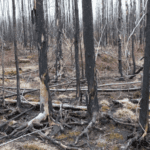Gwen Bridge, MSc, is not only a woman scientist, but an Indigenous scientist, which makes her experience unique among those we’ve interviewed thus far. As a child she was keen on science – mostly because the idea of being a neurosurgeon sounded interesting. Ultimately, however, she has followed in her father’s footsteps: he was an environmental organizer and activist, and worked with a local environmental organization to protect parkland and establish a community forest.
It was this early introduction to environmental science that led Bridge to complete a double major in Environmental Studies and Geography at the University of Victoria, followed by an MSc in Renewable Resources at the University of Alberta in 2003. Her research has focused on forest hydrology, starting first as a field hydrologist and more recently working on water policy and governance, and environmental assessments, with First Nations.
“I realize that I’m more of a people person, so the management aspects of science – managing teams and projects – is what I enjoy, and my science background facilitates that,” she notes. Bridge provides strategic direction for First Nations in Title and Rights strategies in relation to natural resources management. As part of this work, she conducts strategic planning and other meeting facilitation, mainly for First Nations natural resource departments.
As an indigenous woman, Bridge has found that her employers – largely First Nations and Tribes – have been highly supportive and respectful of women both as mothers and as unique contributors to the work force and society. With two children of her own, Bridge has found travel to be a logistical nightmare, though she feels it’s important to be physically present when ideas are being shared and new innovations in her field contemplated. She sees her children as her greatest legacy, however, and to that end has curtailed some of her career ambitions (including travel), and scaled back on work commitments to achieve a better personal balance with home life.
While Bridge – similarly to previous interviewee Catherine Anderson – feels that the challenges women face in science careers are similar to those faced in other fields, a challenge specific to the natural sciences is fieldwork. “Realistically, if a women wants a field-based career in environmental science and wants kids, she’ll likely feel compelled at some point to prioritize kids over fieldwork.” This was also clear from our interviews with both Andrea Kirkwood and Carolyn Relf, who adjusted their field schedules once they had children.
An additional aspect of field-based science is the confidence required to work in the wilderness. “I had to do fieldwork alone, walking long distances to large rivers in areas with huge cougars,” Bridge recalls of her early field hydrologist position. “This wasn’t enjoyable to me, and I didn’t do extensive fieldwork after that!” A recent study also found that fieldwork culture is characterized by an enhanced likelihood of women being subject to sexual harassment or assault, thus increasing the risks for women keen on field-based science professions.
However, fieldwork can be essential in many natural science positions, and Bridge recounts the story of a colleague who had trouble finding work after a divorce. “She was initially field-based, but after she had a child she worked in partnership with her husband, who did the fieldwork. When her marriage failed, it was challenging to find jobs because she couldn’t do fieldwork.”
Bridge encourages girls to pursue their interest in science, as the rewards outweigh the challenges. She feels that completing a master’s degree increased her career choices, and provided additional career security and flexibility that she wouldn’t have had solely with a BSc. “I’ve travelled to many places for work and had many interesting experiences,” she says.
As a First Nations woman, however, she finds that – while science is a key component not only of her education, but of her worldview and career path – “traditional ecological knowledge (TEK) can be just as valuable a methodology for environmental understanding.” For examples of TEK and its role in scientific research, see work from the International Polar Year incorporating Inuit knowledge of Arctic sea ice, and the contribution of TEK to ecosystem-based management in British Columbia.




